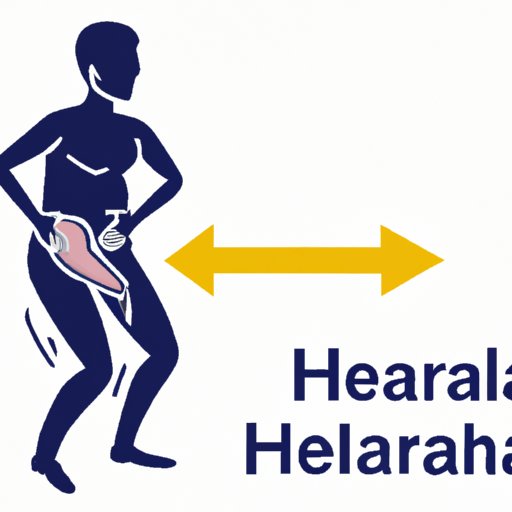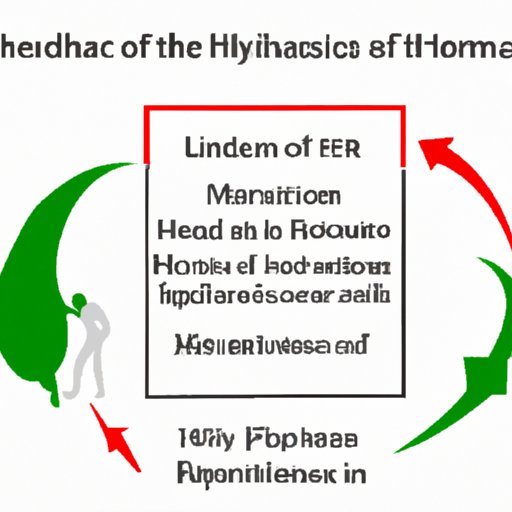
Introduction
At some point in their lives, many people experience digestive issues, one of which is a hiatal hernia. Hiatal hernias are common, but most people do not even realize they have them. This medical condition is classified as a part of gastroesophageal reflux disease, which affects millions worldwide. This article will explore the causes of hiatal hernia and highlight the best ways to avoid it.
Understanding the Causes of Hiatal Hernia: A Comprehensive Guide
A hernia is the result of an internal organ pushing through muscle or tissue in which it typically resides. In this case, the hiatus is the gap in the diaphragm through which the esophagus passes into the stomach. If the area has stretched or torn, the stomach can protrude into the cavity of the chest, resulting in a hiatal hernia.
The diaphragm is a muscle that separates our chest and abdominal cavities. When you breathe, the diaphragm contracts and relaxes, allowing air to flow in and out of the lungs. It also helps move food and drink from the esophagus to the stomach.
A hiatal hernia can happen naturally as you age if the tissue that supports your diaphragm becomes weaker. However, other factors, such as obesity, can increase the likelihood of developing a hiatal hernia. It can also develop as a result of trauma to the abdomen during an accident.
The Surprising Truth About How Hiatal Hernias Develop
Hiatal hernias can develop over a prolonged period, and the symptoms may become noticeable over time. Some of the common symptoms of hiatal hernia include reflux, heartburn, abdominal pain, and difficulty swallowing. These symptoms may get worse when you lie down or bend over, making it difficult to consume certain foods or move easily.
There are generally two types of hernias – a sliding hiatal hernia and a paraesophageal hiatal hernia. The former is when the junction of the esophagus and stomach slides up through the hiatus, and the latter is when the stomach protrudes into the chest. Different types of hernias require specific treatment options, and it’s essential to speak to a medical professional to ensure you get the correct treatment.
What You Need to Know to Avoid Hiatal Hernias
If you want to avoid developing a hiatal hernia, you will need to take some preventative measures. One of the first things you should do is maintain a healthy weight. When you put on weight, it puts additional pressure on the diaphragm, increasing the likelihood of it stretching or tearing.
Another thing that you can do to prevent hiatal hernias is to use correct lifting techniques and posture. When you lift heavy objects, you place a lot of pressure on your abdomen, which may increase the risk of developing a hernia. To prevent this, it’s important to lift with your legs and not your back.

The Role of Lifestyle in Hiatal Hernia Development
Lifestyle choices, such as smoking and excessive alcohol intake, can also contribute to a hiatal hernia. These habits put stress on the diaphragm and abdominal muscles, which can ultimately lead to a hernia. If you want to prevent a hiatal hernia, it’s vital to quit smoking and limit your alcohol consumption.
Diet is another essential factor in hernia prevention. Acidic and spicy foods can exacerbate heartburn and reflux, making it more likely to develop a hernia. Eating smaller meals and avoiding late-night snacking can also help avoid overfilling the stomach and prevent hernias.
Genetic Factors in Hiatal Hernia: What You Need to Know
While hiatal hernias are commonly caused by lifestyle factors, genetics plays a role in their development. If a family member has a hiatal hernia, you are more likely to develop one as well. You can’t change your genetics, but talking to your doctor about preventative options if you have a family history of hernias can reduce your likelihood of developing one.
Reflux, Heartburn, and Hiatal Hernia: The Connection Explained
A hernia does not necessarily cause symptoms. Still, if you have gastroesophageal reflux disease (GERD), a hiatal hernia can aggravate your symptoms. The stomach acid backing up into your esophagus can cause heartburn, regurgitation, and difficulty swallowing. Your doctor may recommend medication and lifestyle changes to help manage your symptoms effectively.
Preventing Hiatal Hernia: Tips and Strategies for a Healthier Digestive System
Maintaining good digestive health is crucial to preventing a hernia. Regular exercise can help regulate your digestive system. Moderate levels of exercise such as walking and running can help prevent weight gain and reduce your risk of developing hiatal hernia in the future.
It’s also essential to stay hydrated and consume a high-fiber diet to improve digestion. Eat at regular intervals, and don’t overfill your stomach as it puts pressure on the diaphragm and can increase the likelihood of developing a hernia.
Conclusion
In conclusion, a hiatal hernia is a common health issue that can significantly impact your quality of life. While some hernias are naturally occurring, others can develop through lifestyle or genetic factors. Still, there are ways to prevent hiatal hernias, including maintaining a healthy weight, staying hydrated, quitting smoking, and limiting your alcohol intake. It is essential to maintain good digestive health to avoid developing a hiatal hernia. Speak to a doctor if you have symptoms that suggest a hernia, but more importantly, follow preventative measures to avoid the condition altogether.





